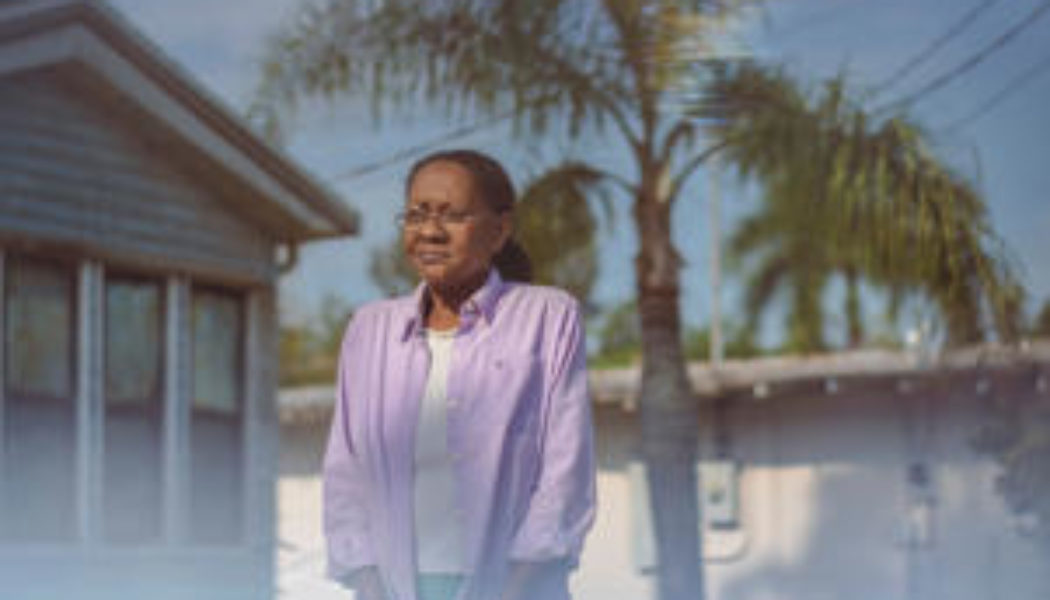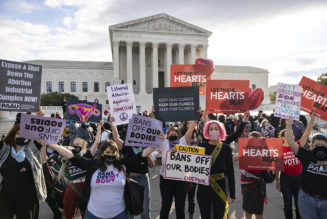Clear majorities of Americans support restrictions affecting transgender children, a Washington Post-KFF poll finds, offering political jet fuel for Republicans in statehouses and Congress who are pushing measures restricting curriculum, sports participation and medical care.
Most Americans don’t believe it’s even possible to be a gender that differs from that assigned at birth. A 57 percent majority of adults said a person’s gender is determined from the start, with 43 percent saying it can differ.
And some Americans have become more conservative on these questions as Republicans have seized the issue and worked to promote new restrictions. The Pew Research Center found 60 percent last year saying one’s gender is determined by the sex assigned at birth, up from 54 percent in 2017. Even among young adults, who are the most accepting of trans identity, about half said in the Post-KFF poll that a person’s gender is determined by their sex at birth.
Alyssa Wells, 29, a behavior therapist in Daytona Beach, Fla., who participated in the Post-KFF survey, said her views have changed on this issue in recent years as she has learned more, chiefly from Christian podcasts.
“At first I was on the side of acceptance, like using the pronouns and stuff, because I want people to be kind to each other. I don’t want people fighting all the time,” she said. But she has come to see things differently. “My concern with transgender is mostly with the children.”
“We can’t vote until we’re a certain age, we can’t smoke, drink or whatever, but we can change our bodies’ anatomy and how it works?” she said. “It just doesn’t seem like that’s okay to me.” Treatments for trans youth sometimes include hormone therapies, but not genital surgery, which guidelines generally say doctors should not provide until patients are 18.
Still, as the country engages in a national debate over public policy around gender identity, interviews and other poll findings suggest that many Americans hold complicated and sometimes contradictory views on the subject.
While a majority of Americans oppose access to puberty blockers and hormone treatments for children and teenagers, for instance, clear majorities also support laws prohibiting discrimination against trans people, including in K-12 schools.
The Post-KFF poll was conducted in November and December, before state lawmakers introduced more than 400 anti-trans bills this year, up from about 150 bills in 2022 according to a Post analysis of ACLU data. It is not clear how the surge of anti-trans bills will affect public opinion or whether new laws targeting drag shows and gender-affirming care for adults will be popular.
“You have a big swath of the American public still trying to make sense of this issue,” said Patrick Egan, a scholar of American politics and public opinion at New York University. “This is a battle and a debate that is unfolding in real time before our eyes, and we don’t know how it’s going to turn out.”
One of the big unanswerable questions is whether public opinion around transgender issues will shift over time as it did around gay and lesbian rights. Some experts see parallels between the two issues, particularly as conservatives center their efforts on children and schools. Early backlash against gay people also focused on allegations that children would be harmed.
But certainly for now, the new Post-KFF poll finds, Republican lawmakers have the wind at their backs on much of their anti-transgender legislative agenda.
Sports
More than 6 in 10 adults in the Post-KFF poll said trans girls and women should not be allowed to compete in girls’ and women’s sports, including professional, college, high school and youth levels.
In that vein, 21 states have passed laws that bar transgender athletes from participating in sports that do not match their sex assigned at birth, according to the Movement Advancement Project, a research group that supports LGBTQ rights. And in April, the GOP-controlled U.S. House approved changes to civil rights law that amount to a national ban, arguing that trans women’s biology gives them an unfair advantage. Even the Biden administration, which is broadly in favor of trans rights, has proposed a regulation that would allow schools to ban trans girls from competition, depending on factors such as the level of competitiveness and the age of the students.
“I think there is an advantage [for trans women], and you can’t put your head in the sand and pretend there isn’t,” said Americo Lopes, 44, an accountant who lives outside Dallas. He compared trans girls competing against cisgender girls to athletes who use steroids. “There is an advantage.”
Medical treatments
The Post-KFF poll found significant opposition to gender-affirming medical care for children and teens. Nearly 7 in 10 adults said they oppose allowing children ages 10 to 14 access to medication that stops the body from going through puberty, and nearly 6 in 10 oppose giving 15- to 17-year-olds access to hormone treatments. (There was, however, majority support for gender-affirming counseling or therapy, with more than 6 in 10 supporting this for both age groups.)
Seventeen states ban hormone and/or other medical treatments for transgender youth. One additional state has taken other action to stop it, according to Movement Advancement Project’s tracking.
Teaching about gender identity
There is also wide support for limits on classroom conversation about gender identity with younger children. More than 3 in 4 adults said it was inappropriate to discuss trans identity with students in kindergarten through third grade, and nearly as many said the same for fourth and fifth grades.
It was a different story, though, for older students. People were roughly divided when asked about middle-schoolers, and nearly 2 in 3 supported discussion of trans identity in high school.
Eight states have laws limiting classroom discussion of LGBTQ issues. For instance, Florida’s law, which critics call “don’t say gay,” banned instruction and classroom discussion about LGBTQ issues from kindergarten through third grade. In April, the state Board of Education extended the ban through 12th grade, which may prove politically less popular, based on the Post-KFF survey.
© Saul Martinez for The Washington Post Valarie Johnson, 67, of LaBelle, Fla., is clear on her stance when it comes to discussing LGBTQ issues in the classroom. “Why would you introduce that subject to children when it has no life skills?” she said.
Valarie Johnson, 67, of LaBelle, Fla., said there’s no place in school for these sort of discussions. “Is that going to help these young people get a good job or a good spouse?” she asked. “Why would you introduce that subject to children when it has no life skills?”
Not surprisingly, views like this are at sharp odds with the opinions of trans Americans themselves.
The Post-KFF poll asked the same questions of trans people, in the largest nongovernmental survey of U.S. trans adults to rely on random sampling methods. The survey found that 2 in 3 trans adults began to understand that their gender differed from their assignment at birth before they were 18, and almost two-thirds of trans adults said it was appropriate to discuss gender identity with the youngest children.
About 7 in 10 trans people said trans girls and women should be allowed to participate in sports with other girls and women. And about 7 in 10 said it was appropriate for children ages 10 to 14 to have access to puberty blockers under medical supervision.
For many of them, these questions are not abstract; they are deeply personal.
© Cooper Neill for The Washington Post Myron-Hollis Keen, a nonbinary man living in East Texas, sees legislation around gender identity as disingenuous. “They’re ‘protecting’ the children from us, and of course they’re not going to protect the trans children.”
Myron-Hollis Keen, 31, a nonbinary man who lives in East Texas, said knowledge of and access to puberty blockers at a young age would have made a huge difference. Without that medication, Keen developed breasts and now wears a sometimes uncomfortable binder to hide them.
“They’re forcing kids to grow up to a body that they already know they’re not going to be comfortable in,” they said.
Keen sees the legislation around gender identity as disingenuous, based on a desire to present trans people as a threat. “They’re ‘protecting’ the children from us, and of course they’re not going to protect the trans children.”
Americans’ views are complex
While there is a huge gulf in public opinion between cisgender and trans Americans, interviews with cisgender adults suggest that many of their views are unsettled. Some see nuance in these debates.
Moshe Peterson, an engineer who lives in Moorhead, Minn., is clear about his views on sports (trans girls should not compete with cisgender girls), and he wants school to stay focused on reading, writing and math. (“It’s hard enough to learn as is without other things thrown at you.”) But he struggles with the question of medication.
“That’s a real tough one,” he said. He would prefer that people wait until they are adults but isn’t sure he wants the law to ban it for those who are younger. “I see both sides. … I’m standing in the center of yin and yang.”
Max Winick, 40, a long-haul trucker from Port St. Lucie, Fla., also feels strongly that trans girls and women have an unfair advantage if they compete in girls’ and women’s sports. “It would be the same thing as letting a man compete in a woman’s sport,” he said.
But Winick was open to the compromise put forward by the Biden administration, in which schools would have to justify excluding trans girls and women based, for instance, on how competitive the sport is or the age of the participants. “If it’s not competitive, what’s the difference?” he asked.
And in Ocilla, Ga., Mark Cromer, 51, does not want gender identity taught in elementary or middle school. But he’s all right with teenagers accessing hormone treatments, and he believes that gender dysphoria is real.
“They are telling the truth,” he said. “They really do feel they should have been born female or male.”
His views have been informed by his stepbrother, who is gay. “I’ve had in-depth conversations with him.” Cromer said his stepbrother is not transgender, but sometimes dresses up in women’s clothing and has taken him to drag shows.
“We just had a blast,” Cromer said. Asked about a new law in Tennessee that bans drag shows in certain situations, Cromer said, “That’s one of the most idiotic things I’ve ever heard of.”
These more nuanced views were also expressed in focus groups on trans issues with swing voters conducted by Third Way, a centrist Democratic think tank, said Lanae Erickson, the group’s senior vice president for social policy and politics.
“This is all very new to the American public, so unlike some of the other cultural issues, these opinions are not set in stone,” she said.
As in the Post-KFF poll, Third Way’s research found significant concerns over sports participation and medical treatments, though Erickson said views would shift when focus group participants were presented with specific scenarios. Voters in the Republican base are animated by these topics, she said, but independents have given them far less thought.
“This is not abortion. This is not even marriage equality. People have not talked about the details. The more you talk to people, the more they change,” she said.
She added that independent voters know a lot more about what it means to be transgender than they used to. Five or 10 years ago, she said, people would talk about drag queens or the movie “Tootsie,” a comedy about an actor pretending to be a woman to get cast in a soap opera. Now people understand better that being transgender relates to one’s internal sense of gender identity, Erickson said.
The Post-KFF poll found that 43 percent of cisgender adults personally know someone who is trans, not counting acquaintances. This group was much more likely to say a person’s gender can differ from that assigned at birth, with 53 percent of them saying that it can, compared with 35 percent of those who do not have that personal connection.
Experts say these sort of personal connections were an important part of increased support for gay and lesbian rights, notably marriage. One outstanding question is whether public opinion on trans issues will follow the same trajectory.
The 43 percent of people who know someone who is trans is comparable to the 42 percent who in 1992 said they personally knew someone who is gay or lesbian, per a CBS News/New York Times poll. That 42 percent grew to 77 percent by 2010.
Transgender people represent about 0.6 percent of the U.S. population, according to surveys, though the figure is higher among those 18 to 29 years old — about 2 percent. When people who identify as nonbinary are included, the totals rise to 1.6 percent of all adults and 5.1 percent of young adults. That compares with an estimated 2.4 percent of American adults who are gay or lesbian.
As with issues of sexual orientation, younger people are more accepting of differences in gender identity than older people are, though the generation gap on gender identity is not as pronounced now as it was on sexual orientation then.
“If past is prologue, we can say that we’re looking at an eight- to 10-year timeline” for views to change, said Andrew Flores, a government professor at American University who has studied public opinion on LGBTQ issues.
His analysis of public opinion polls found that the share of Americans with warm feelings toward trans people has climbed over time. And he noted that trans characters are more present in media and entertainment than ever before. Those shifts both preceded a change in attitudes about gay people.
There are other parallels, too. Early conservative campaigns against homosexuality were also focused on schools. In 1977, pop singer Anita Bryant, well known for her orange juice commercials, sought to overturn an anti-discrimination ordinance in Miami on the grounds that it would bar firing teachers for being gay. The issue was also fought out in California, where voters considered (and rejected) a ballot initiative that would have required teachers to be fired if they were gay.
“Transphobia is really rampant today the way homophobia was with Anita Bryant,” said Natalia Petrzela, a historian of contemporary politics and culture at the New School in New York. In an earlier age, she said, there were allegations that gay teachers were “grooming” students for abuse; those allegations have returned, now focused on gender identity. “I think we’ve evolved. But we haven’t evolved that much.”
The Washington Post-KFF Trans Survey was conducted in English and Spanish from Nov. 10 to Dec. 1, 2022, among 1,338 U.S. adults, including 515 who identify as trans and 823 who are cisgender. Sampling, data collection, weighting and tabulation were managed by SSRS. Trans adults were reached via three survey panels recruited using random sampling methods: The Gallup Panel, NORC’s AmeriSpeak Panel and the SSRS Opinion Panel. Additional trans respondents were recontacted from previous randomized telephone interviews. Cisgender adults were recruited through the SSRS Opinion Panel, and both trans and cisgender samples were weighted to the groups’ estimated size in the population. Results among the sample of U.S. adults overall have a margin of sampling error of plus or minus four percentage points; the error margin is seven points for results among trans adults and four points among cisgender adults.
Emily Guskin contributed to this report.







